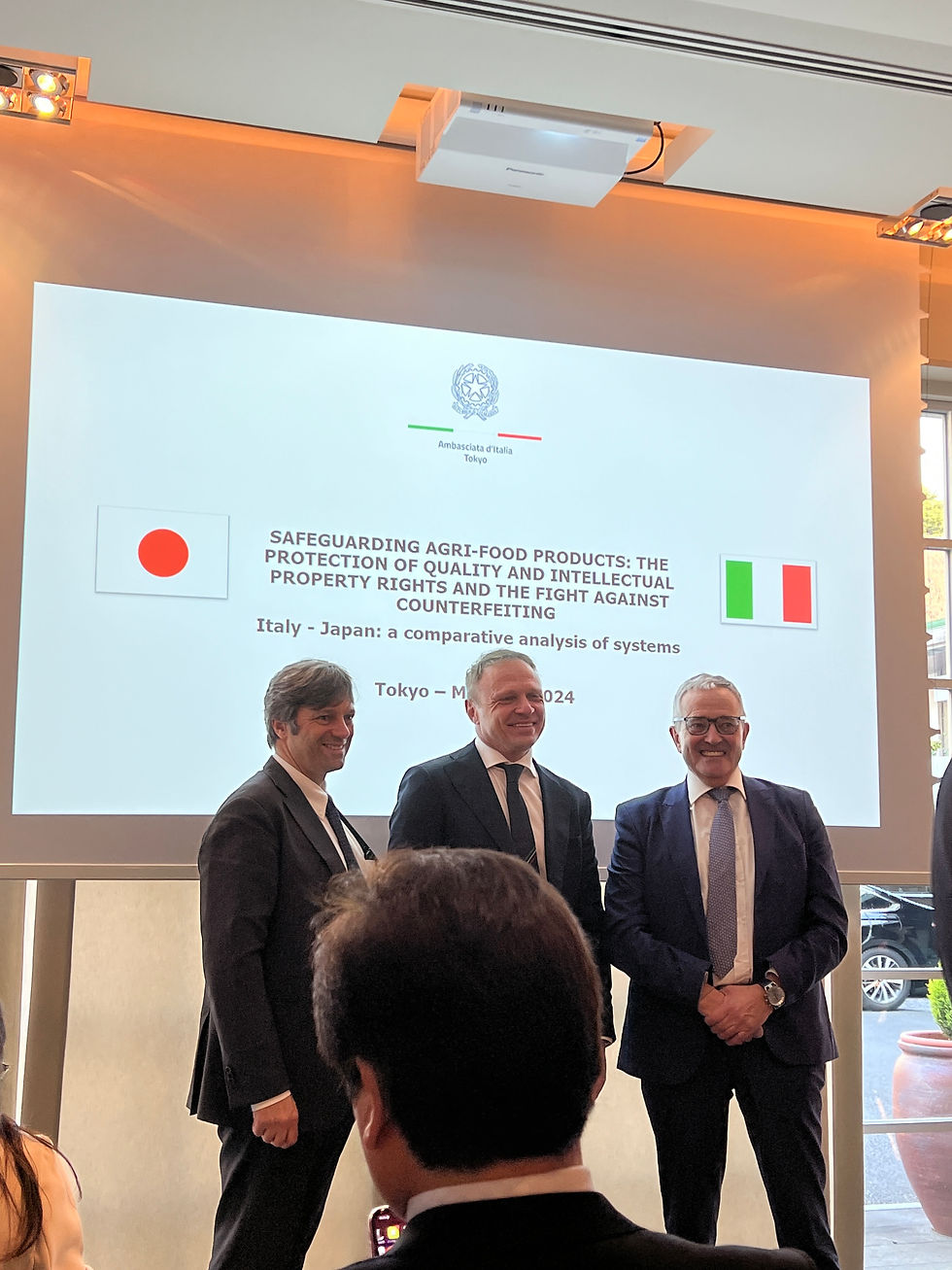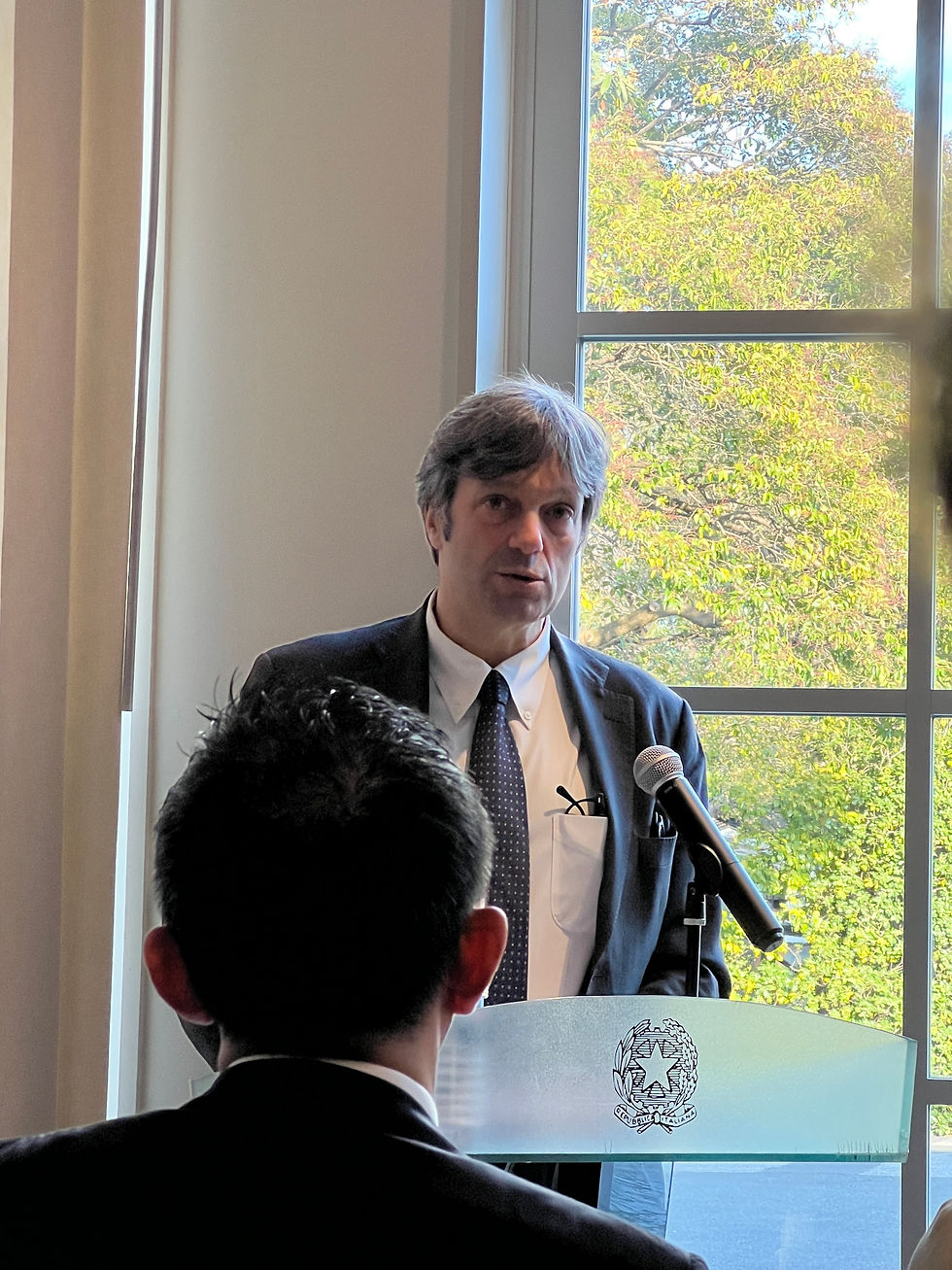How to protect regional brands in Italy and Japan? Italy and Japan's efforts towards geographical indications and the fight against counterfeits and imitations.
- FUSAKO SAKURAI

- Mar 8, 2024
- 3 min read

[Photo] From left to right: Matteo ZOPPAS, Director of the Italian Trade Promotion Agency (ITA); Francesco LOLLOBRIGIDA, Minister of Agriculture, Food Sovereignty, and Forestry (MASAF) of Italy; Oreste GERINI, Director of the Central Audit Agency for Counterfeit Food Products (ICQRF) (Photo by the author)
On March 4, 2024, a seminar on the above topic was held at the "Take no Ma" room of the Embassy of Italy in Japan. This was to declare that this theme is the most important issue for both Italian and Japanese authorities, just ahead of the start of FoodexJapan2024.
In the presence of Ambassador Gianluigi Benedetti, Francesco Paolo Cannito, Counselor of the Economic and Commercial Department of the Embassy of Italy, served as the moderator. The seminar brought together officials responsible for the establishment and promotion of geographical indications in both Italy and Japan, starting with a speech by Francesco Lollobrigida, Minister of Agriculture, Food Sovereignty, and Forestry (MASAF) of Italy. Other participants included Ryosuke Ogawa, a counselor at the Ministry of Agriculture, Forestry and Fisheries (MAFF) of Japan, and Matteo ZOPPAS, Chairman of the Italian Trade Promotion Agency (ITA).
The seminar, which lasted about two and a half hours, was fully attended, indicating a high level of interest among stakeholders from both Italy and Japan on this topic. The "Made in Italy" label represents exports worth €605 billion, approximately one-third of Italy's total production. However, counterfeit products, amounting to €120 billion annually, pose a serious problem.
According to Oreste Gerini, Director of the Central Audit Agency for Counterfeit Food Products (ICQRF), who oversees the monitoring of Italian-sounding products online and offline, an agreement (MOU) with e-commerce operators (Amazon, Rakuten, Alibaba, eBay) to monitor counterfeit Italian products, known as "Italia Sounding," is scheduled to be signed today, March 5, 2024. In 2023, ICQRF conducted 55,000 inspections, of which 43,000 were conducted without prior notice.
Geographical indication systems for agricultural products are essential measures to safeguard quality and consumer health, intertwined with the globalization and complexity of food distribution.
Umberto Maria PALMA, Colonel of the Italian State Finance Police (Guardia di Finanza), pointed out that crimes related to food counterfeiting and imitation are closely linked to international money laundering, tax evasion, illegal immigration, and illegal labor. Therefore, international and inter-agency cooperation is essential for monitoring, enforcement, prevention, and deterrence.
According to Hiroshi Sakuma, Director of the Grain Distribution and Food Labeling Supervision Office in the Consumer Administration and Food Education Division of the MAFF of Japan, Japan can now determine the true origin of agricultural products through DNA genetic analysis. He shared examples of cases where origin fraud, such as with clams or Wagyu beef, has been exposed.
Above all, it is crucial to ensure that consumers recognize brands correctly, which contributes to preventing counterfeit products. Therefore, geographical indications need to be further strengthened in the future.
Ryosuke Ogawa, Counselor at the MAFF, mentioned that 20 years ago, during the Codex International Conference held in Rome, a proposal regarding the standardization of so-called "Parmesan cheese" raised a major issue. However, it was during dinner on the evening of that conference when he first tasted Parmigiano Reggiano and Pecorino Romano, experiencing the difference in taste and diversity, which sparked his initial thoughts on intellectual property rights in food.
According to Mayu NISHIKAWA, International Negotiator in the International Regional Division of the International Department of the MAFF, Japan's GI system began with the enforcement of the Geographical Indications Act in 2015, with 138 registrations, including 48 agricultural products (vegetables and fruits), indicating that there is still much work to be done. Considering Italy's 23,334 geographical indications, Japan still has a long way to go.
In his opening speech, Minister Francesco Lollobrigida emphasized the role of small-scale farmers in leading the conservation of the environment and ecosystems, driving regional economies, fostering regional solidarity, and preserving regional cultural traditions. He also spoke impressively about the young Japanese farmers he met in Miyazaki Prefecture.

模倣食品中央監査機関(ICQRF)局長、Oreste GERINI 氏

日本農林水産省(MAFF)農林水産審議官:小川 良介氏 RYOSUKE OGAWA

イタリア貿易促進庁(ITA)長官:Matteo ZOPPAS 氏

![[Episode 5] Lucanian scenery, a Journey to Basilicata](https://static.wixstatic.com/media/acc86b_0a10f60b0f694751a76438c203593c34~mv2.jpg/v1/fill/w_980,h_653,al_c,q_85,usm_0.66_1.00_0.01,enc_avif,quality_auto/acc86b_0a10f60b0f694751a76438c203593c34~mv2.jpg)
![[Event Report] "Sardinia: Island of the Giants" @ Italian Embassy, Tokyo](https://static.wixstatic.com/media/acc86b_50514ced22ac485e9dc3ccf6e2e6aea2~mv2.jpg/v1/fill/w_980,h_1307,al_c,q_85,usm_0.66_1.00_0.01,enc_avif,quality_auto/acc86b_50514ced22ac485e9dc3ccf6e2e6aea2~mv2.jpg)

Comments